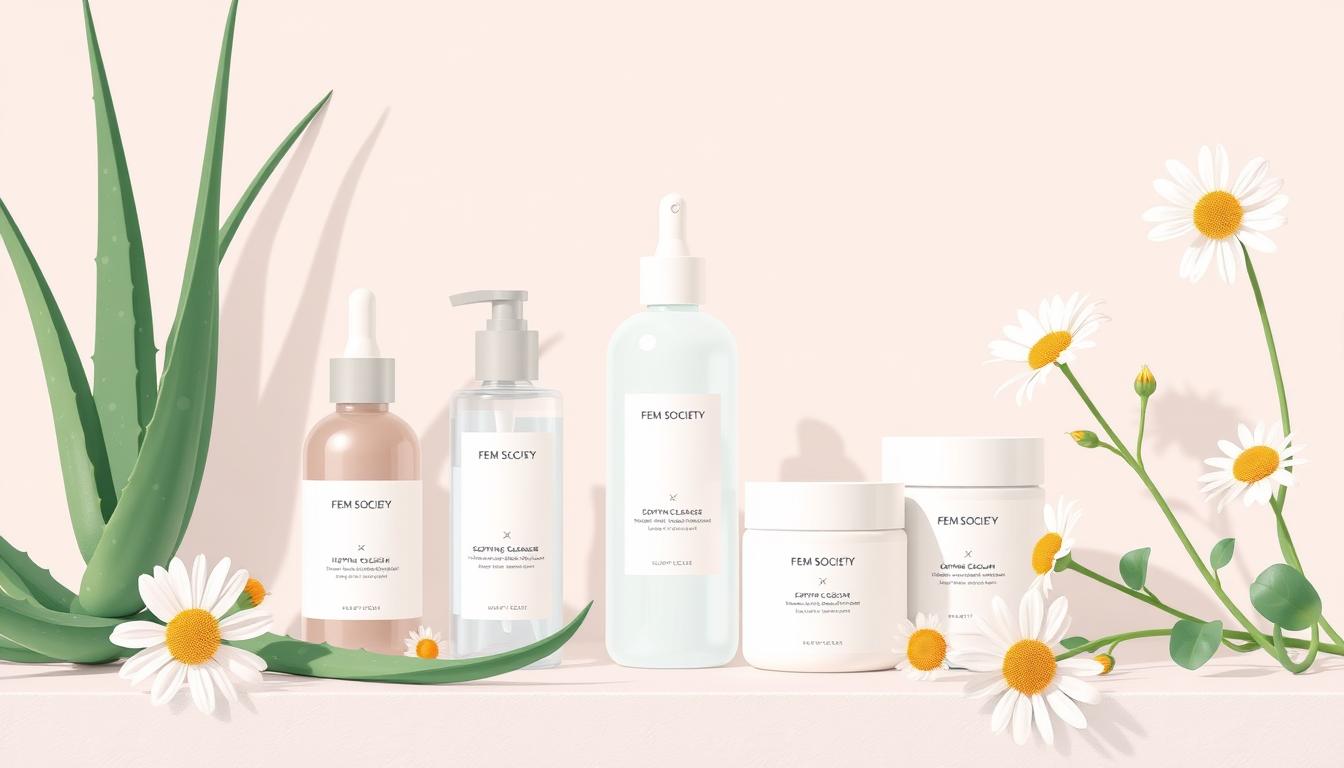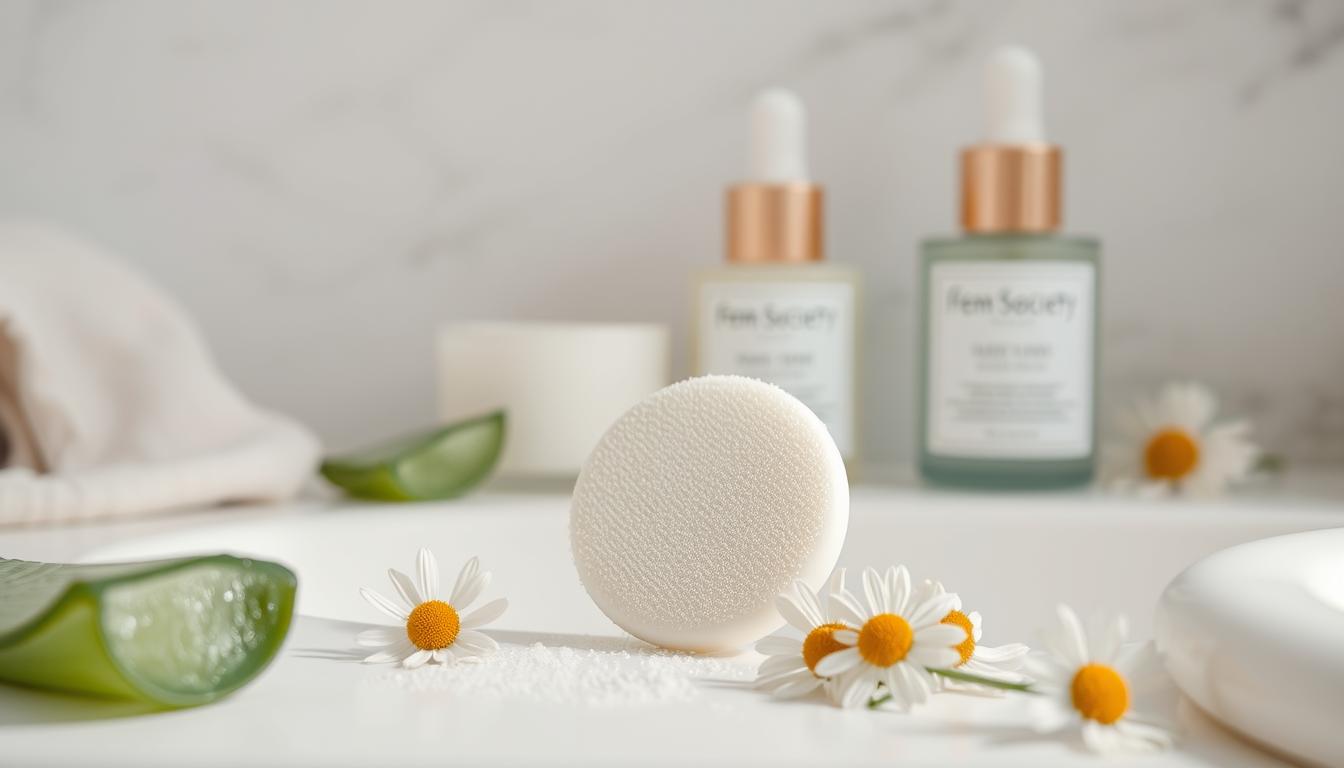Did you know 50% of women in the U.S. have sensitive skin? It can be caused by genes or things like hormones and the environment. It’s important to find the right skincare routine for sensitive skin. This guide will help you make a routine that makes your skin glow and feel good.

Key Takeaways
- Sensitive skin needs a gentle, simple skincare routine to strengthen its barrier.
- The key products are a gentle cleanser, a moisturizer without scent, and a sunscreen with SPF 30 or higher.
- Start with small amounts and test new products on a small area to avoid irritation.
- Using soothing ingredients like aloe vera, chamomile, and vitamin E can calm sensitive skin.
- Stay away from harsh cleansers, exfoliants, and fragrances to keep your skin healthy.
Understanding Sensitive Skin: Signs and Symptoms

If you have sensitive skin, you’re not alone. About 70% of people say they have this skin type. They often get reactions from certain products or the environment. This is because of small differences in the skin’s outer layer, called the skin barrier.
Common Triggers for Skin Sensitivity
People with sensitive skin often get upset by harsh chemicals and strong smells. Extreme temperatures can also bother them. Lack of sleep, stress, and bad nutrition can make things worse. It’s important to know and avoid these triggers to manage sensitive skin.
How to Identify Your Skin Type
To figure out your skin type, watch how it acts during the day and how it reacts to products. Signs of sensitive skin include tingling, stinging, and burning. Paying attention to these signs helps you know your skin type and choose the right skincare.
The Role of Skin Barrier Function
The skin barrier is key in keeping your skin safe and hydrated. If it’s weak, your skin can get more sensitive and have problems. Using sensitive skin care tips and helping your skin barrier is crucial for sensitive skin.
“Sensitive skin may be related to subtle differences in the outermost layer of the skin, such as a weak skin barrier.”
Essential Steps for a Basic Sensitive Skin Routine

If you have sensitive skin, it’s important to have a simple skincare routine. Use gentle skincare products and essential products only. This helps avoid harsh ingredients that can upset your skin.
Begin with a pH-balanced cleanser to gently clean your skin. Next, use a fragrance-free moisturizer to keep your skin moist. Lastly, apply a mineral-based sunscreen to protect your skin from the sun.
This easy, three-step minimalist routine keeps your skin balanced. It also lowers the chance of your skin reacting badly. By sticking to essential products only, your sensitive skin gets what it needs without getting overwhelmed.
| Step | Product Recommendation |
|---|---|
| Cleanse | CeraVe Hydrating Facial Cleanser |
| Tone | Thayers Milky Hydrating Face Toner |
| Serum | Vichy Minéral 89 Prebiotic Serum |
| Moisturize | Youth To The People Adaptogen Cream |
| Sunscreen | La Roche Posay Anthelios AOX Serum SPF 50 |
When making your sensitive skin care routine, always test new products first. Also, change your routine if needed to keep your skin healthy and happy.
Morning Skincare Routine for Sensitive Skin

Creating a good morning skincare routine is key for healthy, glowing skin. Begin with a soft facial cleanser that keeps your skin’s natural oils. Choose a pH-balanced, fragrance-free, and non-irritating formula to clean without irritation.
Step-by-Step Morning Protocol
- Start by gently washing your face with lukewarm water and a daily skincare routine for sensitive skin cleanser.
- Next, use a hydrating toner or essence to balance your skin’s pH and get ready for more steps.
- Then, apply a light, hydrating moisturizer to keep your skin moist and nourished.
- Finally, end with a broad-spectrum mineral sunscreen to shield your skin from UV rays.
Product Application Techniques
When you apply your morning products, gently pat them on instead of rubbing. This helps avoid irritation. Let each product soak in for 30-60 seconds before adding the next. This makes sure they work well and don’t cause pilling.
Timing Between Products
It’s important to space out your morning skincare steps. Make sure your gentle facial cleanser is fully rinsed off before using your toner or essence. Also, wait for your toner or essence to dry before applying your hydrating moisturizer. And let your moisturizer absorb before putting on your mineral sunscreen.
“By following a consistent and gentle morning skincare routine, you can effectively nourish and protect your sensitive skin, setting the stage for a radiant and healthy complexion throughout the day.”
Best Skincare Routine for Sensitive Skin

For those with sensitive skin, a dermatologist-recommended routine is essential. It should be simple yet effective. Use hypoallergenic products and fragrance-free formulas to care for your skin.
Start with a gentle cleanser that won’t harm your skin. Then, apply a hydrating serum with hyaluronic acid or niacinamide. This will make your skin plump and nourished. Finish with a ceramide-rich moisturizer to keep your skin moist and strong.
Remember to protect your skin from the sun every day. Use a mineral-based sunscreen with SPF 30. Stay away from harsh exfoliants and common irritants like fragrances, alcohol, and sulfates.
Being consistent is important for sensitive skin. Keep your skincare routine simple and soothing. Listen to your skin and adjust as needed to keep it calm and healthy.
| Product Type | Recommended Ingredients | Benefits |
|---|---|---|
| Cleanser | Gentle, non-foaming | Removes impurities without disrupting the skin’s barrier |
| Serum | Hyaluronic acid, niacinamide | Hydrates and nourishes the skin |
| Moisturizer | Ceramides | Strengthens the skin’s protective barrier |
| Sunscreen | Mineral-based, SPF 30+ | Shields sensitive skin from harmful UV rays |
“Consistency is key when caring for sensitive skin. Stick to a simple, soothing skincare routine to maintain a calm, healthy complexion.”
Gentle Cleansing: The Foundation of Sensitive Skincare

For people with sensitive skin, gentle cleansing is very important. It’s key to pick pH-balanced cleansers that keep the skin’s natural acidity. This is usually around 5.5. These non-irritating formulas help keep the skin’s barrier strong and avoid irritation.
pH-Balanced Cleansers
Harsh cleansers with sulfates and alcohol can dry out the skin. They make it more sensitive. Instead, choose gentle face wash for sensitive skin. It uses milder surfactants to clean without harming the skin.
Double Cleansing Method
The double cleansing method is good for a deep clean. First, use an oil-based cleanser to get rid of makeup and extra oil. Then, use a water-based cleanser to clean up any left-over dirt. But, for very sensitive skin, just one gentle clean might be enough.
Using cleansing techniques that fit your skin’s needs is key. It helps start a sensitive skincare routine that cares for and protects your skin.
Hydration and Moisturizing Strategies

Drinking water is key for sensitive skin. Look for moisturizers with ceramides, hyaluronic acid, and glycerin. These keep your skin moist and strong. Use moisturizer on damp skin for better absorption.
For more moisture, apply a hydrating serum first. Stay away from thick products that can cause heat and irritation.
Ceramide-rich formulas and hyaluronic acid are great for your skin. Ceramides fix the skin’s barrier, and hyaluronic acid hydrates deeply. For sensitive skin, pick moisturizers that are soft, without scent, and free from irritants.
- Choose hydrating serums with aloe vera or green tea for dry skin.
- Put moisturizer on while your skin is still a bit wet to keep it moist.
- Don’t use thick creams that can hold heat and cause irritation.
By following these tips, your sensitive skin will stay healthy, happy, and glowing.
“Proper hydration is the foundation of healthy, glowing skin, especially for those with sensitivity.”
Importance of Sun Protection for Sensitive Skin

Sun protection is key for people with sensitive skin. Their skin can get hurt by the sun. For the best sunscreen for sensitive skin, choose mineral ones with zinc oxide or titanium dioxide.
Mineral vs. Chemical Sunscreens
Mineral sunscreens reflect and scatter UV rays. Chemical sunscreens absorb them. Mineral sunscreens are gentler and less likely to cause problems.
Application Guidelines
Apply sunscreen last in your morning routine. Use 1/4 teaspoon for your face and neck. Reapply every 2 hours, or after swimming or sweating. Choose a broad-spectrum sunscreen with SPF 30 or higher.
| Sunscreen Recommendation | SPF Level | Reapplication Frequency |
|---|---|---|
| Day-to-day use | SPF 30 or higher | Every 2 hours |
| Extended outdoor activity | SPF 60 or higher | Every 2 hours |
| Amount for face and neck | N/A | 1/2 teaspoon |
| Amount for full body | N/A | 1 ounce |
Use a mineral sunscreen daily and follow the right steps. This will help protect your skin from UV damage.
“Daily sunscreen users showed no detectable increase in skin ageing in 4.5 years, according to a study.”
Evening Skincare Protocol

As the day ends, it’s time for your skincare routine for sensitive skin. Your skin needs extra care to repair and get ready for the night. Start by gently removing makeup and dirt with a micellar water or oil-based cleanser.
This step breaks down tough makeup and sunscreen without drying your skin.
Next, use a gentle, water-based cleanser to clean your face well. Don’t scrub hard or use strong-smelling products. They can make sensitive skin worse. After cleaning, apply treatment products like a hydrating serum or a gentle retinol alternative to fix specific issues.
The last step is to moisturize with a night cream that keeps your skin hydrated all night. Choose creams made for sensitive skin with ingredients like ceramides, glycerin, or aloe vera. Gently rub the cream into your skin so it works while you sleep.
Remember, sensitive skin likes simple routines. Don’t use too many products at night. A simple, effective routine will keep your skin calm, hydrated, and healing.
“Proper nighttime skincare is essential for sensitive skin to restore and replenish. Focus on gentle cleansing, hydration, and nourishment to support your skin’s natural barrier.”
Key Ingredients for Sensitive Skin

If you have sensitive skin, it’s important to watch what’s in your skincare. Some ingredients can make your skin feel better. Others might make it worse. Let’s look at what’s good and what to avoid.
Beneficial Components
Choose products with niacinamide, ceramides, hyaluronic acid, and aloe vera. These soothing ingredients can calm redness and make your skin stronger.
Ingredients to Avoid
Avoid harsh stuff like alcohol, fragrances, essential oils, and aggressive exfoliants like glycolic acid. These irritating ingredients can upset your skin’s balance and cause more problems.
When buying skincare, look for hypoallergenic and non-comedogenic labels. These products are made to be gentle and won’t clog pores. Always test a small area first to make sure it’s safe for you.
| Beneficial Ingredients | Ingredients to Avoid |
|---|---|
| Niacinamide | Alcohol |
| Ceramides | Fragrances |
| Hyaluronic Acid | Essential Oils |
| Aloe Vera | Glycolic Acid |
“Simplifying your skincare routine and choosing gentle, anti-inflammatory botanicals can make a big difference for sensitive skin.”
Treatment Products and Serums

Building a good skincare routine for sensitive skin needs care. Start with gentle products that won’t irritate. Vitamin C serums are great for antioxidants, but choose magnesium ascorbyl phosphate for less irritation.
Niacinamide serums are also good. They help make the skin stronger and less red. Start with new products every other day. If you get irritated, stop and see a dermatologist.
For antioxidant serums, look for vitamins, minerals, and plant extracts. They fight free radicals and make skin look better.
| Product | Key Ingredients | Benefits |
|---|---|---|
| Image Skincare Vital C Hydrating Anti-Aging Serum | Hyaluronic acid, vitamin C | Supports skin elasticity and brightens the complexion |
| Olay Super Serum Night Repair | Vitamin C, collagen peptide, niacinamide | Targets fine lines, dark spots, and dullness |
| Cerave Skin Renewing Night Cream | Fragrance-free, non-comedogenic | Hydrates and nourishes sensitive skin |
When using many serums, add them slowly. Don’t mix strong ingredients together. A dermatologist can help make a routine just for you.
Exfoliation Guidelines for Sensitive Skin

Exfoliation is key in skincare, but it’s extra careful for sensitive skin. Chemical exfoliants like lactic acid are gentler than physical scrubs. They remove dead skin cells without too much irritation.
Chemical vs. Physical Exfoliation
For sensitive skin, chemical exfoliation is best. Chemical exfoliants like lactic acid are gentle. Physical exfoliators like harsh scrubs can be too rough.
Frequency Recommendations
- Begin with exfoliating once a week. If your skin can handle it, you can do it more often.
- Don’t exfoliate too much. It can make your skin dry, red, and irritated.
- After exfoliating, use extra moisturizer and sunblock to keep your skin calm and safe.
Talking to a dermatologist can help find the right exfoliation for you.
| Product | Price | Highlights |
|---|---|---|
| Dr. Dennis Gross Ultra Gentle Daily Peel | $92 (Amazon), $20 (Sephora, Kohl’s) | Contains lactic acid, mandelic acid, salicylic acid, cucumber, and green tea |
| The Ordinary Lactic Acid 10% + HA | $10 (Sephora, Target, Ulta) | Budget-friendly lactic acid and hyaluronic acid peel |
| e.l.f. Gentle Peeling Exfoliant | $10 (3 oz size) | Contains fruit enzymes and licorice extract, suitable for all skin types |
By following these tips, you can keep your skin healthy and glowing. This way, you won’t hurt your sensitive skin.
Managing Skin Reactions and Flare-ups
Dealing with skin reactions and flare-ups can be tough. When your skin is irritated, keep your skincare simple. Use a pH-balanced, fragrance-free cleanser to clean your face gently.
Apply cool compresses or a soothing face mask for sensitive skin to ease the pain. These can make your skin feel better right away. For quick relief, try an over-the-counter hydrocortisone cream. But use it only when needed and stop once your skin gets better.
When your skin is sensitive, use a simple, anti-inflammatory skincare routine. Choose gentle, calming skincare products with aloe vera, chamomile, and green tea. Stay away from things that might irritate your skin, like fragrances and harsh exfoliants. If your skin doesn’t get better, see a dermatologist for help.
FAQ
What are the essential products for a basic sensitive skin routine?
For a basic sensitive skin routine, you need a gentle cleanser without sulfates. Also, use a moisturizer without fragrances. Don’t forget a sunscreen with at least SPF 30.
What are common triggers for sensitive skin?
Sensitive skin can get upset by harsh chemicals and fragrances. Extreme temperatures can also be a problem.
How do I identify my skin type?
To find out your skin type, watch how it acts all day. See how it reacts to different products.
What is the role of the skin barrier in sensitive skin?
The skin barrier keeps out irritants and keeps moisture in. If it’s weak, your skin can get more sensitive and have problems.
What are the key steps in a morning routine for sensitive skin?
Start your morning with a gentle clean. Then, use a hydrating toner or essence. Next, apply a light moisturizer. Finish with a broad-spectrum sunscreen.
What are the essential steps in the best skincare routine for sensitive skin?
The best routine for sensitive skin is simple and works well. Use a gentle cleanser, a hydrating serum, and a moisturizer rich in ceramides. Don’t forget a mineral-based sunscreen.
What are the benefits of using pH-balanced cleansers for sensitive skin?
pH-balanced cleansers keep your skin’s natural acidity at 5.5. This helps keep your skin barrier strong and prevents irritation.
What ingredients are important for sensitive skin moisturizers?
Moisturizers for sensitive skin should have ceramides, hyaluronic acid, and glycerin. These help strengthen the skin barrier and keep moisture in.
Why is sun protection crucial for sensitive skin?
Sun protection is key for sensitive skin because it’s more prone to sun damage. Use mineral sunscreens with zinc oxide or titanium dioxide instead of chemical ones.
What should an evening routine for sensitive skin focus on?
Your evening routine should be gentle and hydrating. Use a micellar water or oil-based cleanser. Then, apply a hydrating serum and a nourishing night cream.
What ingredients are beneficial for sensitive skin, and what should be avoided?
Good ingredients for sensitive skin include niacinamide, ceramides, hyaluronic acid, and aloe vera. Avoid alcohol, fragrances, essential oils, and harsh exfoliants.
How should I introduce new treatment products for sensitive skin?
Start with gentle products and use them every other day at first. If you get irritation, stop using it and see a dermatologist.
What is the best approach to exfoliation for sensitive skin?
Exfoliate sensitive skin carefully with gentle chemical exfoliants like lactic acid or PHAs. Avoid harsh physical scrubs. Start with once-weekly exfoliation and increase if your skin can handle it.
How should I manage skin reactions or flare-ups?
If you have a skin reaction or flare-up, simplify your routine. Use cool compresses to soothe irritation. For short-term relief, try over-the-counter hydrocortisone cream. If it doesn’t get better, see a dermatologist.